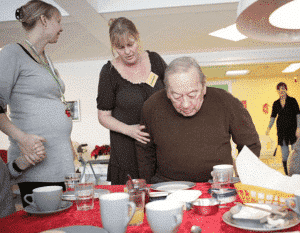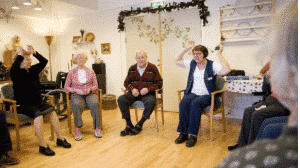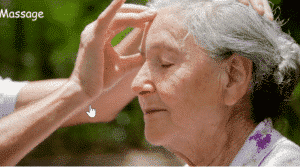Everyday life in focus.
The idea is that residents have a real influence on their own lives, and it is their own habits and needs that largely govern everyday life. Daily doings such as meals, laundry and cleaning should no longer take place far away from residents, but close to them, and in cooperation with them.

A nursing home is a place where people who need care can live a life that is meaningful for the individual. A life where not only the care of the body is important but also social activity. Throughout our life, we do many daily tasks and consider at a number of big and small tasks. Every day’s tasks are important for the experience of identity.
Everyday activities can also help to avoid further loss of function and with age, greater effort is required to avoid function and skills loss, as age-related physical capacity drops.(e.g. muscle strength) bring older people closer to a critical physical capacity threshold, it is necessary to perform daily tasks. Put in another way, it increases the vulnerability of the elderly as he/she reserve capacity decreases.
Everyday life is composed of activities and participation and the importance we attach to, for one person it is important that he/she gets a specific cup for the morning coffee, for another this may be very irrelevant. It is necessary to understand the differences between people’s everyday life.

Every day, we fulfill certain roles based on the values and habits we have. Habits enable us to recognize a situation and act without consideration, attention and reflection. That is, permanent habits enable automated behavior. Therefore, habits are good as they create peace of mind; they are well known. Roles regulate which behaviors are in order and organize the daily activities. If you are a housewife, you are expected to act in a certain way, so roles affect the way and content of the interaction. Roles require solving routine tasks. If you are a host at a party, it cannot be discussed who says, “You are welcome”. In addition, roles divide daily and weekly courses into time blocks when we perform different roles in a week. Perhaps we attend church on Sundays or meet with old work colleges on Tuesdays.
Many elderly at nursing homes have suffered a massive loss of roles. Family roles sometimes are the only ones left, and they may be hard to fill in like the person want it too. Lack of ability to maintain roles, values, and interests influences the beliefs of older people in their own ability to act negatively. For the most vulnerable elderly, the construction of a fragmented self-image can be supported when they are with people who knew them as they were before they got dementia.
To be able to engage in significant activities recognized in one’s culture affect health, well-being, and help making life meaningful. Feeling useful, having control, creating and maintaining contact with other people allow for personal development and, not least, self-confidence.
It can be difficult to find out which activities make the individual happy, here is the life story important, otherwise, you must be observant in their approach to the individual. Various activities general meet human needs.

For example, it may be difficult to meet the need for warmth and touch when you live in nursing homes; many are only touched, in intimate care situations of care. Therefore, most people find that stimulation of the tactile sense is nice; it may be scalp, facial or foot massage or a spa bath. The other senses can also be stimulated through music, dance or singing. Taste and smell is stimulated when the caregiver cooks or bakes together with the residents. Watching that the food is being made, perhaps to give good advice and also being active. Scent and taste of good food, wake up the appetite, increase the well-being, entice small eater to taste, wake up memories and provide good conversation topics. The movement and positioning can be stimulated through play and movement.
According to the Eden concept, a daily life must be ensured, the opportunity to have both duties and enjoyment, privacy and communities, to be outdoor and indoor, as well as having the possibility of having company of animals and children while providing the necessary and qualified care. A natural everyday rehabilitation effect is achieved because of the efforts of competent and incentive staff in a respectable, equal partnership with the residents and their families. Hope, dignity and well-being are preserved.
